28 Days Later: How Quarantine Affected Internet Marketing. Serpstat Research

Highlights:
Market changes during the quarantine

The coronavirus pandemic severely hit the business, especially small and medium. Economic conditions have changed and toughened. The market makes new rules: either the business quickly adapts to them and somehow keeps afloat, or it turns out to be overboard.
About two months have already passed from the beginning of the quarantine. Throughout this period, Serpstat, a digital marketing tool, has been collecting data and preparing a study. When everything is over, they will be able to analyze the impact of isolation on Internet marketing. Finally, Serpstat is ready to present its results!
We shall now give the floor to Serpstat! Happy reading!
The purpose of the study
Serpstat's mission is to develop small and medium-sized businesses by influencing Internet marketing. Here at Serpstat, we provide access to tools that help digital specialists, work with educational centers, conduct educational events, and offer free access to our academy for SEO and PPC training. Our team also carries out surveys involving internet marketing specialists to make the market more transparent.
Serpstat users are primarily specialists working for in-house teams and agencies, as well as freelancers in the field of internet marketing, so it’s also essential for us to understand how the quarantine has affected them and their projects.
To study the changes in internet marketing caused by the crisis, we launched an anonymous survey involving 4,511 respondents (from the USA, Germany, Spain, and other countries).
The results of the study allow us to get a more accurate representation instead of making a subjective assessment of the situation.
This is an opportunity for Serpstat and other companies specializing in the digital sphere to understand how a niche lives, what problems it has, what we should keep in mind during strategic planning. The study provides businesses with information about measures being taken in the market and shows ideas for interacting with customers. For specialists, this study is interesting because it allows you to evaluate career prospects.
Key results of the survey
What is happening in the niche of internet marketing?
- 60% of respondents say that their companies didn't have layoffs and didn't plan to do it. 24% of respondents confirmed that they have layoffs.
- 40% of participants get cut salaries; another 9% of companies plan to implement it.
- 64% of respondents switched to work from home.
- 27% of online projects experienced increased traffic, while projects of 28% of respondents showed a decrease in traffic.
- 46% of respondents lost several clients during quarantine, but 12% even attracted new ones.
- 25% of respondents stated that they developed anti-crisis plans, and another 10% fixed the cost of their services.
- 63% of businesses prefer to use SEO budgets for contextual advertising.
Participants of the survey
4,511 respondents from the USA, Germany, Spain, and other countries took part in the study. The graphs below show the general demographic characteristics of respondents: sex, age, and region of residence.
We also found out the type of company, position, work experience, and level of professional competencies for a detailed description of the survey participants. All these parameters make it possible to assess who has been affected by significant changes.
So, according to the survey, 31% of the survey participants work in online agencies, 20% are freelance specialists, and 49% are representatives of inhouse teams. The distribution of respondents by company size is more even. 26% of respondents said that they work in a company with less than five employees, 22% - from five to nineteen, 52% - from 20 people in a company.
The main share of respondents are SEO specialists - 48%, and 27% - Digital marketers. The smallest number of participants work as Email marketers - 3%.
According to the survey, 10% of respondents have been working in the field of Internet marketing for less than a year, 35% - from one to three years, 55% - from four to ten years.
So, among the respondents, Middle-level specialists prevail (35%), 27% - Team Leads/Heads, 23% - Senior and 15% - Junior according to the standard gradation of competency levels adopted by IT companies. It is clear that not all companies have taken such a system, but it helps bring the assessment of a specialist’s degree to a single value as much as possible.

Market changes during the quarantine
Quarantine didn't cause layoffs for the internet marketing niche. So, 60% of respondents noted that their companies didn't have staff reductions and are not planning. A quarter of respondents said that their companies had layoffs, and 8% of respondents said that cuts are only expected in their companies. The vast majority of participants - 90% replied that the reductions didn't affect them personally.
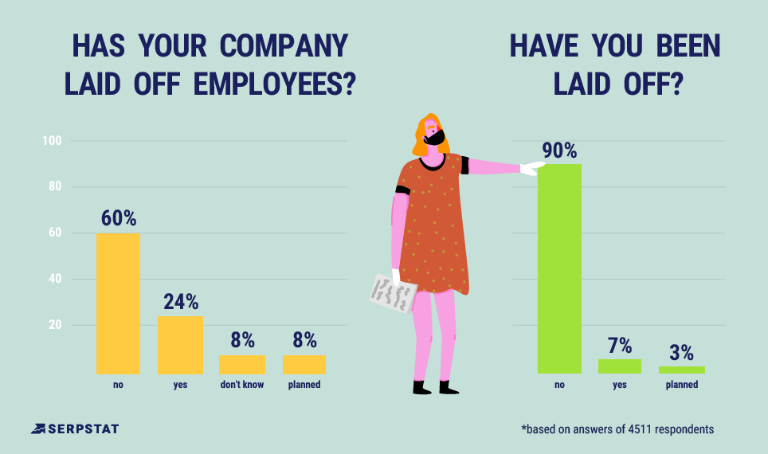
Most companies are not interested in laying off internet marketers and think that it is better to survive difficult times with the team, taking anti-crisis measures.

Most companies quickly responded to quarantine and shifted employees to work from home. 64% of respondents confirmed that they started working from home. The share of survey participants who had previously worked from home was 18%, and 12% of respondents said that they had previously chosen where it is more convenient for them to work. Only 8% of online marketers continue to work in offices.
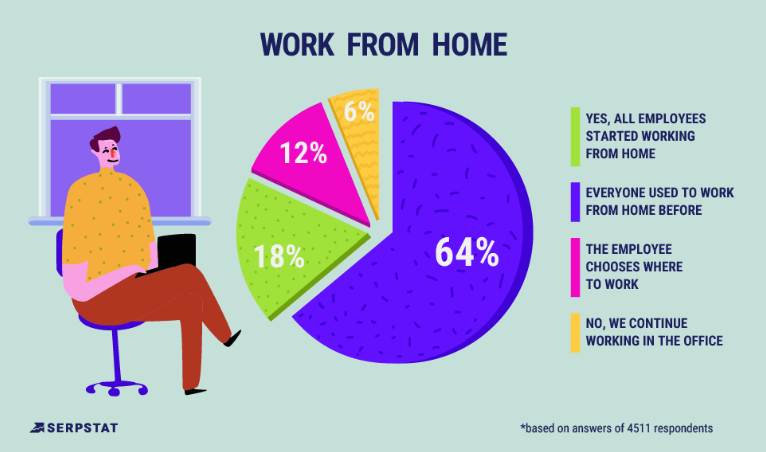
In Serpstat, remote work or work from home was a rare thing. But quarantine urged us to shift the entire staff to work from home as soon as possible. It took Serpstat and Netpeak Group 2 days to move the whole team of 600 employees to work mode from home. Read the article to know how we set up all processes remotely.
As for the number of clients, 46% of the respondents lost part of their customers, nothing changed for 20%, and 12% of the participants noted that quarantine incited them to activate and attract new customers. 22% of survey participants don't have information about customers.
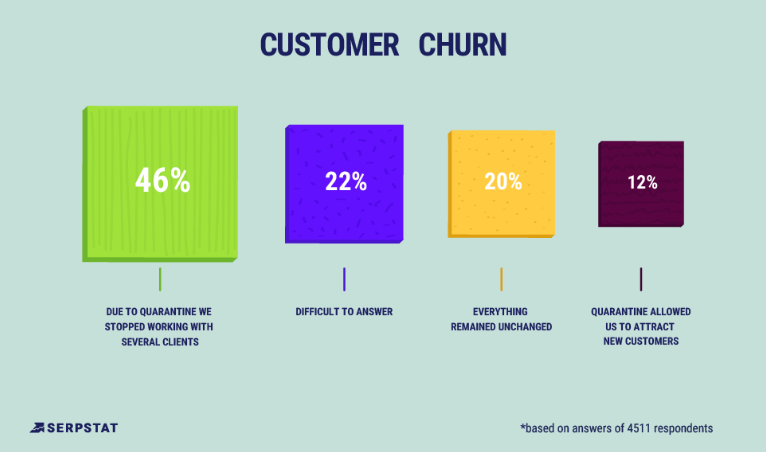
Half of the respondents said that they encountered a drop in online sales in their projects. The slight decline was noted by 27%; 26% of respondents witnessed a dramatic decrease in sales. At the same time, 18% of respondents experienced an increase in sales, and 13% said that nothing changed.
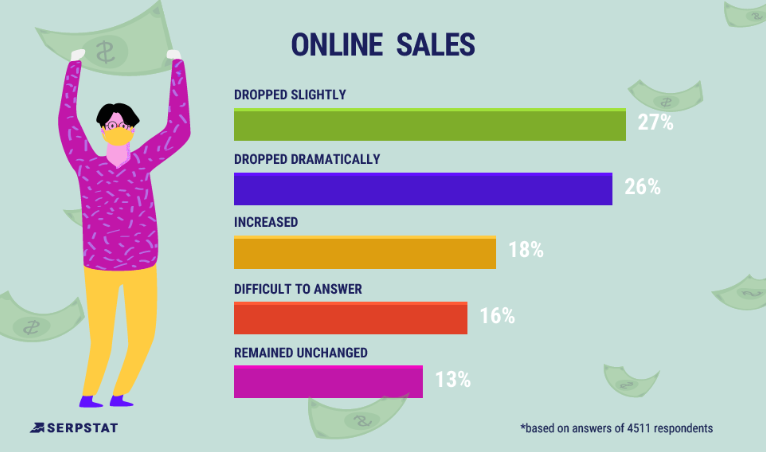
Not to lose online sales, 63% of respondents confirmed the redistribution of SEO-budget in favor of contextual advertising. The change of priorities from long-term to short-term events indicates that businesses are trying to minimize the impact of quarantine on their performance.
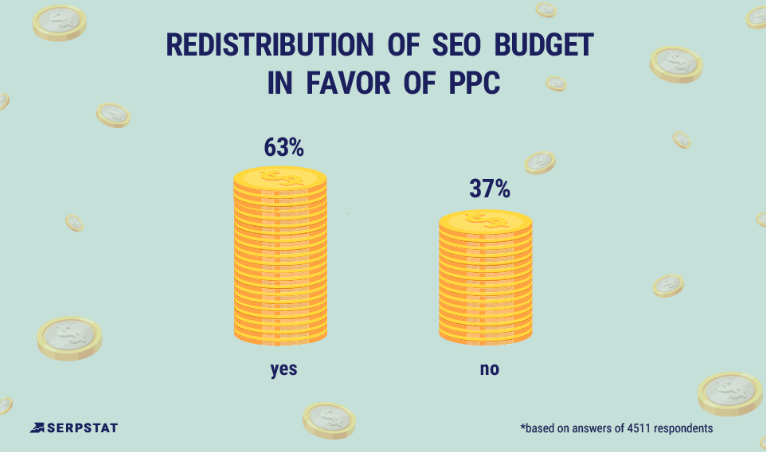
According to the results of the survey, the online traffic grew in 27% of cases, dropped in 28%, and dropped dramatically in 15% of the projects.
Thus, we confirmed that the influence of quarantine on user behavior directly depends on the niche. Some projects only benefit from the fact that users now spend time on social networks, blogs, and other information resources. At the same time, due to the growth of activity in social media, the level of information noise increased.
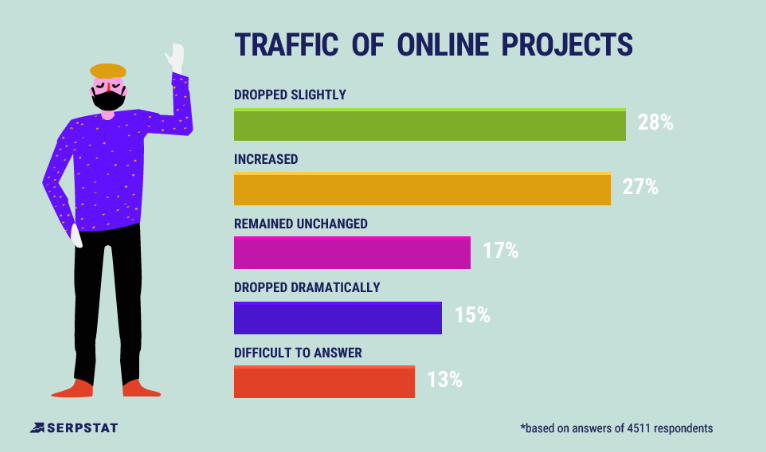
58% of respondents said that their companies took some actions to retain current customers. In 30% of cases, companies launched sales and provided discounts on services, 25% prepared anti-crisis plans or subscriptions, 24% offered some services for free, 10% fixed the cost of their services in national currency.
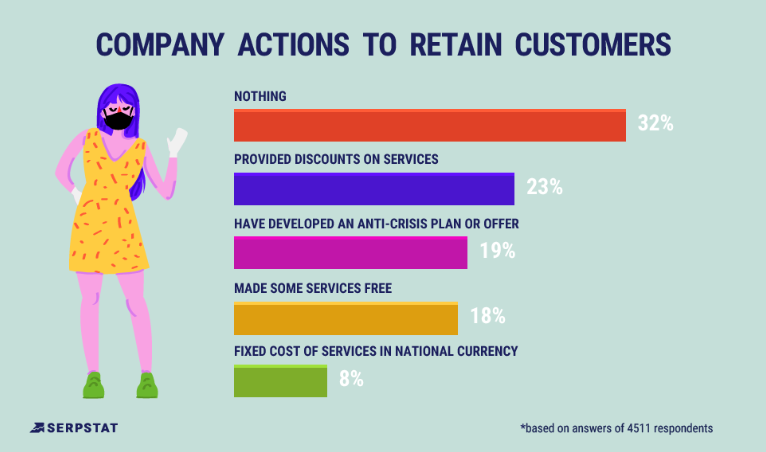
It's clear that the shift from bricks and mortar businesses, especially retail, to online was pivotal in the success that the quarantine had on the digital marketing industry. Demand far outweighed supply, which has caused a knock-on effect in the job market too, with salaries increasing across the board. I suspect this seismic shift will continue for some time, as the high street tries to find relevancy again.
Matt Janaway, MarketingLabs
Conclusions
Most entrepreneurs in the internet marketing believe that it is necessary to adapt as much as possible to new conditions not to lose current customers and quickly return to pre-quarantined indicators. For this purpose, they carry out optimization and cost reduction, including maintenance of employees.

- 58% of companies have taken measures to retain current customers.
- 63% reallocate budgets to activities that bring results in the short term.
- Companies of 49% of survey participants cut salaries or plan to do so soon.
- 32% of companies have layoffs or plan to do it.
At the same time, some respondents talk about increasing the volume of work and improving business indicators: 18% of respondents noted an increase in sales, 27% - an increase in traffic, 12% - received new customers.